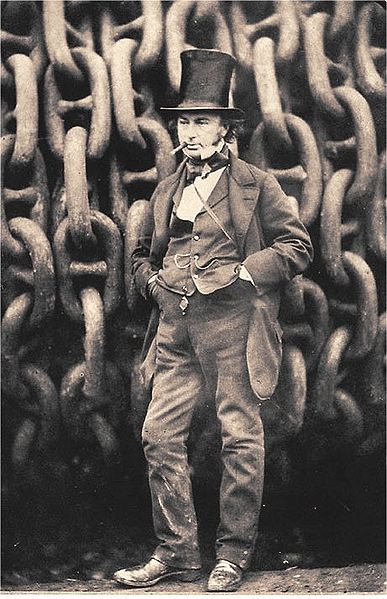Not Suitable for Engineers: Choking Danger December 20, 2012
Author: Beach Combing | in : Modern , trackbackBeach is not a huge fan of modern medicine. But when you see what our ancestors had to go through health-wise, every so often he feels a certain warmth towards the white coated ones. Take this horrific account concerning Isambard Kingdom Brunel’s brush with death after a conjuring trick accident (!).
Mr. Brunel, the celebrated engineer, had several narrow escapes with his life; but the most extraordinary accident which befell him was that which occurred while one day playing with his children, and astonishing them by passing a half-sovereign through his mouth out at his ear. Unfortunately, he swallowed the coin, which dropped into his windpipe. The accident occurred on the 3rd of April, 1843, and it was followed by frequent fits of coughing, and occasional uneasiness in the right side of the chest; but so slight was the disturbance of breathing, that it was for some time doubted whether the coin had really fallen into the windpipe.
After the lapse of fifteen days Sir Benjamin Brodie met Mr. Key in consultation, and they concurred in the opinion that most probably the half-sovereign was lodged at the bottom of the right bronchus. The day after, Mr Brunel placed himself in a prone position on his face upon some chairs, and, bending his head and neck downwards, he distinctly felt the coin drop towards the glottis. A violent cough ensued, and on resuming the erect posture he felt as if the object again moved downwards into the chest.
Here was an engineering difficulty, the like of which Mr Brunel had never before encountered. The mischief was purely mechanical; a foreign body had got into his breathing apparatus, and must be removed, if at all, by some mechanical expedient. Mr Brunel was, however, equal to the occasion. He had an apparatus constructed, consisting of a platform which moved upon a hinge in the centre. Upon this he had himself strapped, and his body was then inverted in order that the coin might drop downward by its own weight, and so be expelled. At the first experiment, the coin again slipped towards the glottis, but it caused such an alarming fit of convulsive coughing and appearance of choking, that danger was apprehended, and the experiment was discontinued.
Two days after, on the 25th, the operation of tracheotomy was performed by Sir Benjamin Brodie, assisted by Mr. Key, with the intention of extracting the coin by the forceps, if possible. Two attempts to do so were made without success. The introduction of the forceps into the windpipe on the second occasion was attended with so excessive a degree of irritation, that it was felt the experiment could not be continued without imminent danger to life. The incision in the windpipe was, however, kept open, by means of a quill or tube, until the 13th of May, by which time Mr. Brunel’s strength had sufficiently recovered to enable the original experiment to be repeated. He was again strapped to his apparatus; his body was inverted; his back was struck gently; and he distinctly felt the coin quit its place on the right side of his chest. The opening in the windpipe allowed him to breathe while the throat was stopped by the coin, and it thus had the effect of preventing the spasmodic action of the glottis. After a few coughs the coin dropped into his mouth. Mr. Brunei used afterwards to say that the moment when he heard the gold piece strike against his upper front teeth, was, perhaps, the most exquisite in his whole life. The half-sovereign had been in his windpipe for not less than six weeks.
Enough to put you off magic for life. What kind of trick is it that allows a coin to fall into your windpipe? drbeachcombing AT yahoo DOT com



